See also
- Apostle (Christian)
- Christian ministry, as age-specific ministry, creative and performing arts, community service and outreach.
- Lay apostolate
- Sodality
An apostolate is a Christian organization "directed to serving and evangelizing the world", most often associated with the Anglican Communion or the Catholic Church. [1] In more general usage, an apostolate is an association of persons dedicated to the propagation of a religion or a doctrine. The word apostolate comes from the Greek word apostello, which means to "send forth" or "to dispatch". The Christian origin of the word comes from the twelve apostles who were selected by Christ; they had a "special vocation, a formal appointment of the Lord to a determined office, with connected authority and duties". [2] An apostolate can be a Christian organization made up of the laity or of a specific Christian religious order.
Within Anglican theology and Catholic theology, "ministry" pertains to the administration of a sacrament; or the celebration of liturgy and all that pertains to the liturgical functioning of the Church; as such it is specific to those with Holy Orders. Laity have a different role, namely, to spread the truth of Christianity in the world through whatever means they can [3] — this is properly called an apostolate. An example of a Catholic apostolate is Catholic Answers, run by laity whose mission is to spread the Gospel of Jesus Christ and Catholicism in the world. Similarly, an example of an Anglican apostolate is The Saint Martin Apostolate of Prayer, whose aim is the "sanctification of all priests through the continual offering of prayers on their behalf by the faithful." [4] [5]

Anointing of the sick, known also by other names such as unction, is a form of religious anointing or "unction" for the benefit of a sick person. It is practiced by many Christian churches and denominations.
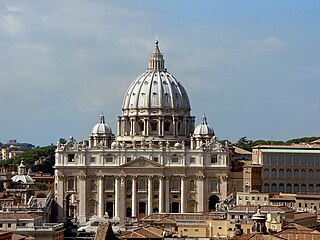
Apostolicam Actuositatem, also known as the "Decree on the Apostolate of the Laity", is one of the 16 magisterial documents of the Second Vatican Council.

Personal prelature is a canonical structure of the Catholic Church which comprises a prelate, clergy and laity who undertake specific pastoral activities. The first personal prelature is Opus Dei. Personal prelatures, similar to dioceses and military ordinariates, are under the governance of the Vatican's Congregation for Bishops. On 4 August 2022, personal prelatures will be instead governed under the Dicastery for the Clergy. These three types of ecclesiastical structures are composed of lay people served by their own secular clergy and prelate. Unlike dioceses, which cover territories, personal prelatures—like military ordinariates—take charge of persons as regards some objectives regardless of where they live.
In religious organizations, the laity consists of all members who are not part of the clergy, usually including any non-ordained members of religious orders, e.g. a nun or a lay brother.

The Priestly Fraternity of Saint Peter is a traditionalist Catholic society of apostolic life for priests and seminarians which is in communion with the Holy See.
Absolution is a traditional theological term for the forgiveness imparted by ordained Christian priests and experienced by Christian penitents. It is a universal feature of the historic churches of Christendom, although the theology and the practice of absolution vary between denominations.

The Legion of Mary is an international association of members of the Catholic Church who serve it on a voluntary basis. It was founded in Dublin, as a Marian movement by the layman and civil servant Frank Duff.
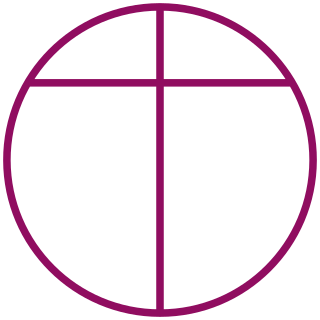
The Priestly Society of the Holy Cross is an association of Catholic diocesan priests which is integrally united to the Prelature of Opus Dei.

Terrence Thomas Prendergast is a Canadian member of the Society of Jesus who is also a prelate of the Roman Catholic Church and the Archbishop Emeritus of Ottawa-Cornwall. He was formerly an Auxiliary Bishop of the Archdiocese of Toronto and the Archbishop of Halifax. On 6 May 2020 Pope Francis merged the Archdiocese of Ottawa and the Diocese of Alexandria-Cornwall, naming Prendergast Archbishop of the newly formed Archdiocese of Ottawa-Cornwall. He formally retired in 4 December 2020, and was succeeded by Marcel Damphousse, the Coadjutor Archbishop.

Lay ecclesial ministry is the term adopted by the United States Conference of Catholic Bishops to identify the relatively new category of pastoral ministers in the Catholic Church who serve the Church but are not ordained. Lay ecclesial ministers are coworkers with the bishop alongside priests and deacons. In other contexts, these may be known as "lay pastoral workers", "pastoral assistants", etc.
The lay apostolate is made up of laypersons, who are neither consecrated religious nor in Holy Orders, who exercise a ministry within the Catholic Church. Lay apostolate organizations operate under the general oversight of pastors and bishops, but need not be dependent upon them for direction.
Ordinatio sacerdotalis is an apostolic constitution issued by Pope John Paul II on 22 May 1994 in which he discussed the Catholic Church's position requiring "the reservation of priestly ordination to men alone" and wrote that "the Church has no authority whatsoever to confer priestly ordination on women". While the document states that it was written so "that all doubt may be removed regarding a matter of great importance", it has been contested by some Catholics, as to both the substance and in the authoritative nature of its teaching.

The Paulist Fathers, officially known as the Missionary Society of Saint Paul the Apostle, is a society of apostolic life of the Catholic Church founded in New York City in 1858 by Isaac Hecker in collaboration with George Deshon, Augustine Hewit, and Francis A. Baker.

The sacrament of holy orders in the Catholic Church includes three orders: bishops, priests, and deacons, in decreasing order of rank, collectively comprising the clergy. In the phrase "holy orders", the word "holy" means "set apart for a sacred purpose". The word "order" designates an established civil body or corporation with a hierarchy, and ordination means legal incorporation into an order. In context, therefore, a group with a hierarchical structure that is set apart for ministry in the Church.
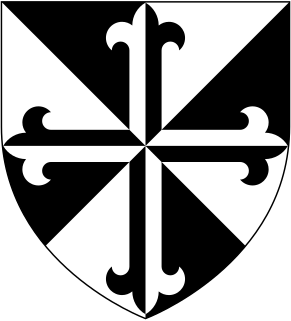
The Third Order of Saint Dominic, also referred to as the Lay Fraternities of Saint Dominic or Lay Dominicans since 1972, is a Roman Catholic third order affiliated with the Dominican Order.

In the liturgical traditions of the Catholic Church, the term ordination refers to the means by which a person is included in one of the orders of bishops, priests or deacons. The teaching of the Catholic Church on ordination, as expressed in the 1983 Code of Canon Law, the Catechism of the Catholic Church, and the apostolic letter Ordinatio sacerdotalis, is that only a Catholic male validly receives ordination, and "that the Church has no authority whatsoever to confer priestly ordination on women and that this judgment is to be definitively held by all the Church's faithful." In other words, the male priesthood is not considered by the church a matter of policy but an unalterable requirement of God. As with priests and bishops, the church ordains only men as deacons.
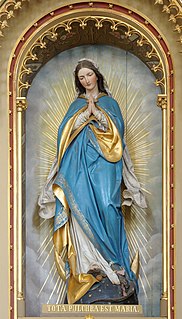
The Fatima Family Apostolate (FFA) is a U.S.-based Roman Catholic Apostolate with headquarters in Hanceville, Alabama, founded in 1986 by Fr. Robert J. Fox and named after Our Lady of Fátima. Mr. John C. Preiss is currently the President.

Jesus Youth(JY) is an International Catholic Movement, approved by the Holy See. The Movement evolved as an outcome of the Charismatic revival that spread across India in the mid-1970s. It had its beginnings in Kerala, India, and evolved as an active part of the Catholic Charismatic Renewal of the state in the late 1970s. In 1985, the International Year of Youth, a number of youth groups came together under a single name, Jesus Youth. Gradually, it spread to different parts of India and to a number of other countries. On 20 May 2016, it was granted recognition by the Vatican as an international private association of the faithful with juridical personality. The movement follows a lifestyle modelled on the life of Jesus Christ, based on what it calls 'six pillars', namely, personal prayer, Bible reading, Sacraments, fellowship, evangelization and option for the poor.
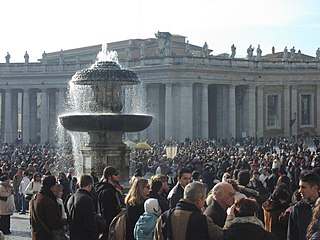
Catholic laity are the ordinary members of the Catholic Church who are neither clergy nor recipients of Holy Orders or vowed to life in a religious order or congregation. Their mission, according to the Second Vatican Council, is to "sanctify the world".
The Society of Saint Pius X is an international priestly fraternity founded in 1970 by the French Roman Catholic Archbishop Marcel Lefebvre.
Ministry is something directed to the service of the Church and its members, while apostolate is directed to serving and evangelizing the world.
On the Feast of Saint Martin of Tours, November 11, 2002, at the initiative of Fr Marco Vervoorst, the Parish Priest of the Parish of The Resurrection in Loxton, South Australia, a fraternal association of Priests (and Deacons) came into being with three priests committing themselves to the Fraternity. The Priestly Fraternity of S. Martin - known by its Latin title Fraternitas Sacerdotalis Sancti Martini - hence FSSM. A group of Anglican (mostly TAC) priests who are dedicated to living out their promises made at ordination within the context of catholic worship in its English expression, ie the Prayer Book and English Missal.
The Saint Martin Apostolate of Prayer is part of the ministry of the Priestly Fraternity of S. Martin. The aim of "The Apostolate" is the sanctification of all priests through the continual offering of prayers on their behalf by the faithful.